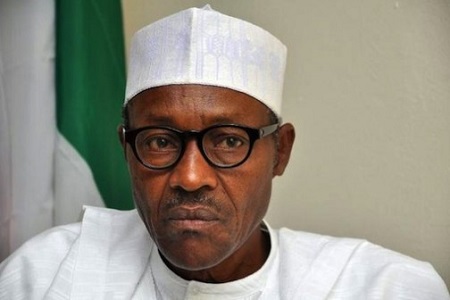Following the outrage caused by the arrest of court judges by the DSS, a prominent rights group has reacted to the development.

President Muhammadu Buhari
The Socio-Economic Rights and Accountability Project, SERAP, a rights advocacy group, has reacted to the arrest of sitting court judges by the DSS.
The group has written President Muhammadu Buhari, demanding the immediate and unconditional release of Nigerian judges arrested in the midnight of Saturday by operatives of the Department of State Services.
According to The Punch, the group, which also wrote the United Nations on the case, threatened to take legal action, both locally and internationally, against the President, should the arrested judges not be immediately freed.
SERAP said, in a statement on Sunday by its Executive Director, Adetokunbo Mumuni, that while it fully supported Buhari’s anti-corruption war, it viewed the clapdown on judges as a chilling “blow on the independence of the judiciary and a dangerous precedent that should not be allowed to stand.”
The group feared that if the development was allowed to stand or continue, it would make judges susceptible to pressure from the executive and spell the final collapse of judiciary’s independence.
Apart from asking the President to order the immediate release of the judges, SERAP also demanded a probe of the DSS over the development and punishment for everyone found culpable.
SERAP said, “We are seriously concerned about the wave of arrests, intimidation and harassment of judges across the country by the DSS. While we fully support the government’s efforts to eradicate judicial corruption, we cannot accept anti-corruption strategies and methods which patently offend the rule of law and undermine the authority, integrity, sanctity and independence of the judiciary.
“SERAP believes that strategies and methods to sanction suspected corrupt judges must never have an inhibiting or chilling effect on the authority, sanctity, integrity and independence of the judiciary.
“The uncertainty of the processes and grounds on which suspected corrupt judges can be sanctioned would affect the capacity of all judges to act independently, and the public confidence in the judiciary.
“Judges, like other constitutional functionaries, must face the law if they depart from or deceive the law, such as when they are suspected of engaging in corruption. But what the DSS has done is a blow to the independence of judiciary, and a dangerous precedent that should not be allowed to stand.
“The value of the principle of judicial independence is that it protects judges from arbitrary sanctions by the government. The way this country dispenses justice and treats its judges will show the moral and legal character to which it can pretend.”
SERAP noted that in the world over, the body that sanctions erring judges is usually independent of the government.
It stressed that without a judiciary that is independent, the concept of rule of law would become a mockery.
“Judicial accountability must respect the fundamental principles of the independence of the judiciary and the separation of powers, and its proceedings must be in line with constitutional and international standards of due process and fair trial. Indeed, international standards require that the bodies responsible for sanctioning corrupt judges should be independent from the government, and that any legal sanction against suspected corrupt judges must be determined in accordance with well-established procedures that guarantee the rights of judges to a fair and transparent trial, and to an independent review,” SERAP said.

